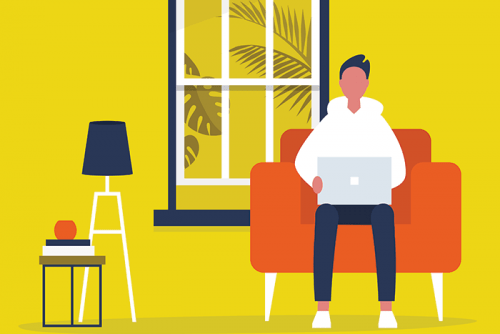During a global crisis like the coronavirus pandemic, it’s understandable that we would want to follow the news. We don’t know how long we will have to live with restrictions, how jobs and the economy will be impacted, or if we or our loved ones will be exposed to the virus.
“Right now, there is a degree of uncertainty that is unprecedented for most of us,” said Jacqueline Bullis, PhD, a clinical psychologist in McLean Hospital’s Center of Excellence in Depression and Anxiety Disorders. “When uncertainty is high, it drives our brains to seek as much information as possible to feel in control.”
According to Bullis, staying glued to the television or constantly refreshing our social media feeds may help us feel slightly less anxious in the short term. These behaviors ultimately have the opposite effect.
“In the long term, these behaviors are increasing our anxiety by feeding into this belief that if we have enough information, we can control what happens,” she said. “The more we seek certainty over what will happen in the future, the more anxious we will feel. It is impossible to be 100% certain of what the future holds regarding COVID-19.”
Can Anxiety Be Helpful?
Even under ordinary circumstances, watching too much TV or consuming limitless social media can be problematic when it interferes with fulfilling our roles and responsibilities, according to Bullis. “Studies show that screen time before bed can lead to insomnia and sleep disturbances, which in turn make us more vulnerable to anxiety, low mood, and irritability,” she said. “Those who struggle with anxiety and depression sometimes turn to TV or social media as a form of avoidance.”
The coronavirus pandemic is challenging because of how quickly our understanding of it changes. Anxiety is an adaptive emotion, preparing us to respond to a future threat. Bullis said that some amount of it is helpful because it reminds us to take appropriate precautions to protect ourselves. “But many of us may worry about missing something important,” she added. “That feeds into the urge to continually check our news feeds or keep the news on all day.”
Control What You Can
Since our schedules have been disrupted by the pandemic, we may have more time than ever to watch the news or follow social media. Changes to routines and the impact of physical distancing are likely to cause increased anxiety, fear, anger, loneliness, and other negative emotions for many. This may motivate more withdrawal and increased screen time.
According to Bullis, we can cope with anxiety at this time by accepting what is beyond our control. She suggested “refocusing our attention on factors we can manage, such as washing our hands frequently and practicing physical distancing.” We can also take good care of ourselves by maintaining our routines, eating well, exercising, getting enough sleep, and staying connected with loved ones.
Step Back From the News
While some media consumption is fine, Bullis said that we can take steps to limit our exposure to troubling news:
- Determine what information is helpful in learning ways to stay safe (such as how to wear face coverings when in public) versus what is unhelpful and can lead to more anxiety (such as looking up the number of new cases every day).
- Be selective about media. Stick to trusted sources, such as the World Health Organization and the Centers for Disease Control and Prevention.
- Limit time spent engaging with COVID-19 news. Bookmark trusted sites and check them for updates just once or twice per day.
- Remove anxiety-provoking information from your social media feeds. If people you follow are filling your feeds with upsetting information, mute or hide their posts.
Good News Is Still Out There
We can also engage with media in ways that help offset feeling lonely or upset:
- Follow social media accounts that focus on uplifting news. Try Instagram’s @goodnews_movement and @upworthy or YouTube’s Some Good News, hosted by John Krasinski, who hails from Newton, Massachusetts.
- Create a group text with friends or family where you share uplifting news stories with each other.
- Use the new Netflix feature, Netflix Party, to watch shows remotely with friends.
When reading or viewing news stories, it’s important to check in and see how they make us feel. Bullis suggested checking in with yourself by asking, “Do you feel an increased sense of community, connection, and shared humanity, or increased feelings of anxiety and despair?” She also advised checking the quality of the news you’re reading. “As a general rule,” she said, “if the news you’re consuming isn’t providing information that educates you on how to stay safe, it might just contribute to fear and anxiety.”
Looking for ways to reduce feelings of anxiety and despair during these difficult times? Try strategies from McLean experts to help feel mentally balanced and safe. Visit our COVID-19 mental health resources page to learn more.